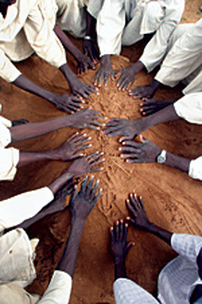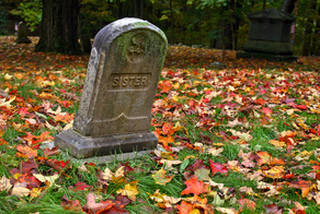The Prophet ﷺ said, "It is not permissible for any Muslim who has something to will to stay for two nights without having his last will and testament written and kept ready with him," reported by Abdullah bin Umar. |
Last Will and Burial

Wikipedia photo
For new Muslims, an important issue you should tackle without delay is your wishes upon your death. This includes both how your assets are distributed as well as what your wishes are regarding your burial. Allah the All-Mighty is the only one with knowledge about when our death will happen, and it could happen at any time. Therefore, it's prudent to arrange for your end of life wishes.
Last Will and Testament (Al-wasiyya)
Muslims living in non-Muslim countries should take extra care in making their wishes upon death to be documented in the form of a will. If you die without a will, the laws in non-Muslim countries take precedence and may likely deal with your assets in ways which do not agree with Islam, particularly when it comes to the burial and division of assets.
For converts, it is likely you could have a non-Muslim family member carrying out your last wishes, particularly if you are not married and to a Muslim. If one's next of kin is family who are not Muslims, would they set aside their own hopes for you and still be able to respect your faith and its decrees? This and other speculations make it befitting and prudent for Muslims to hasten to put their wishes in a Last Will as mentioned above. The Prophet (SAW) said "It is not permissible for any Muslim who has something to will to stay for two nights without having his last will and testament written and kept ready with him."
A will is a transaction which comes into operation after the death of the testator (the one who makes the will). The will is executed after payment of funeral expenses and any outstanding debts. The testator should appoint someone (the executor/al-wasi) to carry out their will and to manage their estate. The executor can be either male or female, must carry out the wishes of the testator according to Islamic law, and must watch for the best interests of the children (if any) and of the estate, among other duties. The Qur'an has outlined many details about how assets are to be distributed in all kinds of circumstances. This link has an excellent reference to Qur'an for this.
The will is a document which should be completed either through an attorney, or there are many templates available online for self-guidance (location where you hold your residence is an issue due to variances in laws, obstacles, etc). The importance of having an official legal document is that it ensures the legal validity of one's will and safeguards the wishes therein from being disregarded.
Below are a few links regarding wills and will making, but note I can't testify to their standard.
Last Will and Testament (Al-wasiyya)
Muslims living in non-Muslim countries should take extra care in making their wishes upon death to be documented in the form of a will. If you die without a will, the laws in non-Muslim countries take precedence and may likely deal with your assets in ways which do not agree with Islam, particularly when it comes to the burial and division of assets.
For converts, it is likely you could have a non-Muslim family member carrying out your last wishes, particularly if you are not married and to a Muslim. If one's next of kin is family who are not Muslims, would they set aside their own hopes for you and still be able to respect your faith and its decrees? This and other speculations make it befitting and prudent for Muslims to hasten to put their wishes in a Last Will as mentioned above. The Prophet (SAW) said "It is not permissible for any Muslim who has something to will to stay for two nights without having his last will and testament written and kept ready with him."
A will is a transaction which comes into operation after the death of the testator (the one who makes the will). The will is executed after payment of funeral expenses and any outstanding debts. The testator should appoint someone (the executor/al-wasi) to carry out their will and to manage their estate. The executor can be either male or female, must carry out the wishes of the testator according to Islamic law, and must watch for the best interests of the children (if any) and of the estate, among other duties. The Qur'an has outlined many details about how assets are to be distributed in all kinds of circumstances. This link has an excellent reference to Qur'an for this.
The will is a document which should be completed either through an attorney, or there are many templates available online for self-guidance (location where you hold your residence is an issue due to variances in laws, obstacles, etc). The importance of having an official legal document is that it ensures the legal validity of one's will and safeguards the wishes therein from being disregarded.
Below are a few links regarding wills and will making, but note I can't testify to their standard.
Hadith: "A man may do good deeds for seventy years but if he acts unjustly when he leaves his last testament, the wickedness of his deed will be sealed upon him, and he will enter the Fire. If, (on the other hand), a man acts wickedly for seventy years but is just in his last will and testament, the goodness of his deed will be sealed upon him, and he will enter the Garden." (Ahmad and Ibn Majah) |
Islamic Burial
Muslims have very specific ways of carrying out burial rituals. In the West or non-Muslim countries, the funeral parlor who arranges burial are sometimes very well informed about Islamic burial practices. However, this could vary depending on where you live.
Here are some details regarding Islamic burial:
Muslims have very specific ways of carrying out burial rituals. In the West or non-Muslim countries, the funeral parlor who arranges burial are sometimes very well informed about Islamic burial practices. However, this could vary depending on where you live.
Here are some details regarding Islamic burial:
- Washing: Muslims should be washed (ghusl) prior to burial, with no embalming. Attendants of the same sex, preferably close family, should complete/oversee this ritual.
- Clothing: The deceased Muslim is wrapped in 2 meters of white cloth; this is the burial dress, to protect the deceased's privacy and dignity.
- Prayer: A funeral prayer (Janazah prayer) should be performed for the deceased.
|

